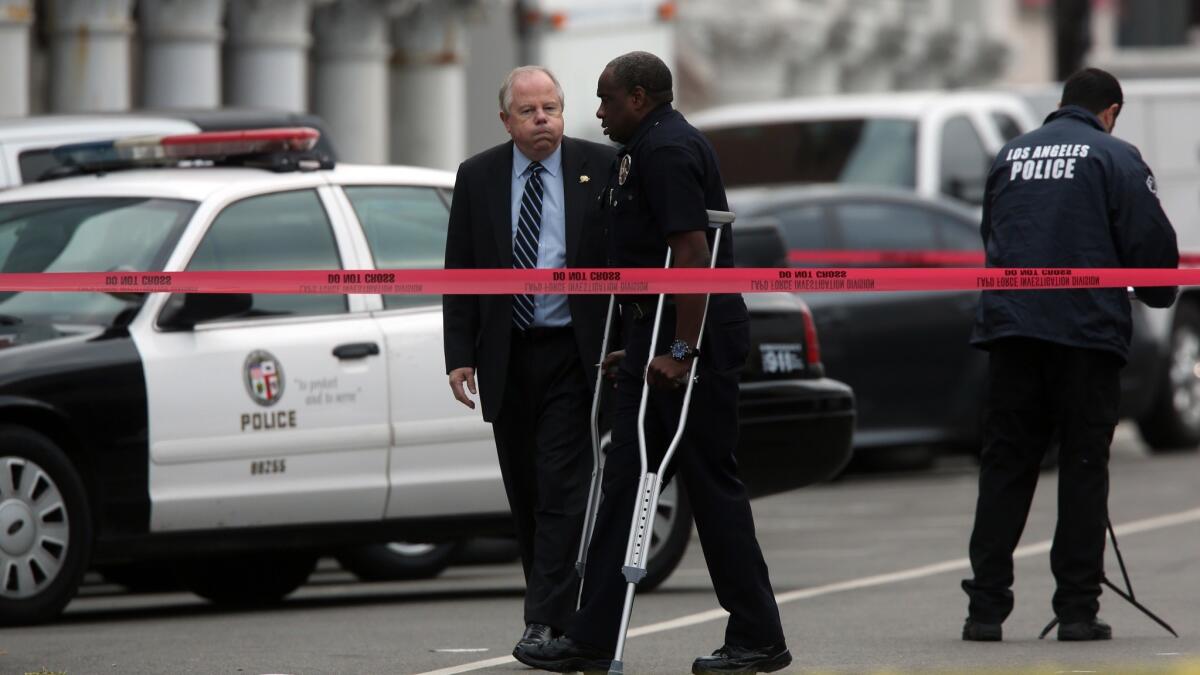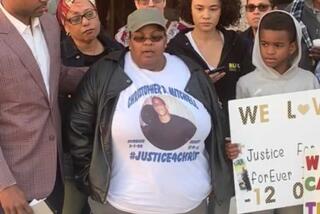If D.A. Jackie Lacey won’t charge the LAPD officer who shot Brendon Glenn, some ask: When would she prosecute?
If there was ever a police shooting that would bring criminal charges against a law enforcement officer in Los Angeles, the killing of Brendon Glenn near the Venice boardwalk looked like it could be the one.
The shooting was captured on video. Los Angeles Police Chief Charlie Beck issued an unprecedented public call for the officer to be prosecuted. And the city paid out $4 million to Glenn’s family.
But nearly three years later, Los Angeles County Dist. Atty. Jackie Lacey decided not to bring charges against Officer Clifford Proctor, marking a rare public clash between two of the L.A. area’s top law enforcement officials.
Her decision illustrates how even at a time of intense nationwide scrutiny of police officers and calls to hold them more accountable for using deadly force, it remains extremely rare to prosecute officers for on-duty shootings.
The law is heavily weighted in favor of officers if they reasonably perceived a threat to themselves or others when they opened fire — even if that belief was mistaken.
Lacey’s supporters say she made a prudent calculation that she would not win at trial, sparing a police officer the ordeal of unnecessary criminal charges and herself the public humiliation of losing a high-profile case.
But her critics say she appeared so intent on clearing the officer that her 83-page memo justifying her decision reads like it was written by a defense lawyer. Since taking office in 2012, Lacey has not brought charges against a police officer for an on-duty shooting.
Some legal experts were concerned by Lacey’s reasoning, saying it might signal to officers that when there is a tussle in close quarters, they could be able to justify opening fire by later claiming the suspect was trying to disarm them.
Glenn is the third fatal high-profile LAPD shooting in recent years involving a similar scenario. In the March 2015 shooting of Charly Keunang on Skid Row, prosecutors determined that Keunang wrapped his fingers around an officer’s gun as the officer yelled, “He’s going for my gun!” Ezell Ford was fatally shot in South Los Angeles after he allegedly knocked a police officer to the ground and grabbed the officer’s gun.
All three victims were unarmed black men.
“In any arrest where a civilian engages in a physical response — arrests of drunk people, the mentally ill, irate civilians, any of these types of arrests — the officer just has to formulate or allege a belief that the victim is going for their gun, and they have a blanket justification for shooting that individual,” said Eric Miller, a professor at Loyola Law School. “I think that’s horrific.”
David Harris, a professor at University of Pittsburgh School of Law, said it is unusual for a police chief to recommend the prosecution of one of his own and even rarer for a prosecutor to then decline to press charges.
“It tells me that what Chief Beck saw in this case was significantly different from the run-of-the-mill misconduct,” Harris said.
But Harris noted that the law on police use of force is broad enough to accommodate both Beck’s and Lacey’s conclusions. A police chief and a district attorney are coming at the case from different angles, he said.
“The chief sees somebody who doesn’t belong on the police force and violated the basics of the law, while the prosecutor sees someone she has to go to trial against,” Harris said. “She looks at the same law and has to consider whether she actually can win the case. If she doesn’t feel she can do that, she’s not supposed to go forward.”
Glenn had recently moved to Los Angeles from New York to look for work. The 29-year-old often camped out on the beach in Venice with other young homeless people.
The night of May 5, 2015, Glenn clashed with customers at a bar on Windward Avenue. A bartender called 911, reporting that Glenn was being “loud and obnoxious” and refusing to leave, according to Lacey’s report.
When Proctor and his partner, Jonathan Kawahara, arrived, Glenn approached them with a large dog.
On Kawahara’s body camera video, Proctor is captured using an expletive and telling Glenn to back off.
“Don’t come over here with your dog or I will shoot your dog,” Proctor threatens on the video, which is included in Lacey’s memo.
In his report, Beck faults Proctor for using a loud voice and cursing, which “likely escalated the situation.”
Lacey, on the other hand, terms the officers’ demeanor “calm and professional.”
In the body camera video, Glenn appears intoxicated, slurring his words and speaking belligerently to Proctor, who, like Glenn, is black.
The officers urge Glenn to leave. He eventually walks away, and Kawahara shuts off his camera.
But Glenn continues to cause trouble, yelling at customers entering another bar on the block. Grainy video taken from a security camera mounted outside one of the local bars shows a bouncer confronting Glenn and throwing him to the sidewalk.
Proctor and Kawahara enter the frame and attempt to handcuff Glenn. The officers wrestle with him on the ground, trying to bend his arms behind his back and handcuff him.
Despite the weight of two officers on his back, Glenn starts to stand up, wrapping his right arm around Kawahara’s right leg. Glenn’s left hand is not visible in the video, so it is unclear whether he is reaching for Kawahara’s gun, which the officer carries on his left side. Proctor draws his own gun and fires two shots into Glenn’s torso. Glenn rolls onto his back.
Moments afterward, Proctor attempts to give him CPR, but Glenn is fatally wounded.
Kawahara told investigators that he did not feel any tugging on his gun belt and did not know why Proctor shot Glenn.
Less than two days after Glenn died, Beck announced that he was “very concerned” about the shooting.
He had viewed the surveillance video, which he said did not show a good reason why Proctor killed an unarmed man.
In January 2016, Beck stated that Proctor should be criminally prosecuted. Two months later, he sent police commissioners a report concluding that a “reasonable” police officer would not have viewed Glenn as a deadly threat. The commission concurred. Glenn’s mother and young son later won a $4-million civil settlement against the city. Proctor resigned from the LAPD in 2017.
It took nearly three years for Lacey to come to her own decision.
Her report includes interviews from witnesses, none of whom saw Glenn trying to grab Kawahara’s weapon. Tests of the DNA on Kawahara’s gun belt were inconclusive, though Glenn could not be ruled out as a source.
Greg Meyer, a use-of-force expert hired by Lacey’s office, concluded that Proctor drew his gun and assumed a shooting stance in a manner “consistent with a developing perception of imminent danger.”
The movement of Glenn’s right hand could have “reasonably excited fear” on Proctor’s part, Meyer noted.
“Even if Glenn was not actually reaching for any of Kawahara’s weapons, given the struggle that was ongoing, Glenn’s movement may have caused Proctor to reasonably fear that he was reaching for a weapon,” Lacey’s report said.
Meyer retired from the LAPD after 30 years. In Lacey’s report, he is identified as a veteran police officer without specifying the agency where he worked.
After announcing her decision on March 8, Lacey said she did not examine whether the shooting was justified but rather, whether she could win the case. Proctor could successfully argue that he was defending himself or his partner out of genuine fear for their safety, she concluded.
“That’s a difficult hurdle to overcome,” she said. “Not that it can’t be — and not that there won’t be a case in the future.”

She criticized Beck’s public announcement in favor of criminal charges, saying it was unprecedented in the history of the district attorney’s office.
“It raises expectations when the evidence just may not be there,” Lacey said. “The police chief is not the prosecutor. It is not his job to prosecute any case. It is not his job to go to court and put up any kind of proof. That’s my job.”
Robert Saltzman, a retired associate dean at USC Gould School of Law, was a member of the Police Commission when it reviewed the Glenn shooting.
Saltzman, who left the commission in 2016, criticized Lacey’s choice not to take Beck’s opinion into account. If Lacey did not file charges in this case, when she had “strong evidence” as well as the police chief’s rare recommendation to move forward, it is hard to imagine her ever prosecuting an officer for an on-duty shooting, said Saltzman, who taught legal ethics at USC.
Lacey’s report, he said, “bends over backwards to find, and then rely on, speculative conclusions to exonerate the officer.”
Seth Stoughton, a professor at University of South Carolina School of Law and a former police officer, reviewed Lacey’s memo and said he believed the evidence was strong enough to bring to a jury.
“If the prosecutor is unwilling to even present the case to a jury because the officer has a facially plausible story, then all an officer has to do is say, ‘He was reaching for my gun,’ or, ‘I thought he was reaching for my gun,’ ” Stoughton said.
But Lawrence Rosenthal, a professor of law at Chapman University, praised the report as “extremely thorough, high-quality and professional.”
Police misconduct cases are extremely difficult for prosecutors to win, he said. Juries tend to view the police officer not as a killer but as someone who made a mistake at work while trying to protect the public, he said.
In Baltimore, he noted, the six police officers charged in the death of Freddie Gray were found not guilty or had their cases dropped.
In this case, Glenn resisted arrest and put himself within reach of a police officer’s gun.
“That’s got acquittal written all over it,” he said. “You’ve got a prosecutor who is far-sighted.”
[email protected] | Twitter: @cindychangLA
[email protected] | Twitter: @katemather
[email protected] | Twitter: @marisagerber
More to Read
Sign up for Essential California
The most important California stories and recommendations in your inbox every morning.
You may occasionally receive promotional content from the Los Angeles Times.













